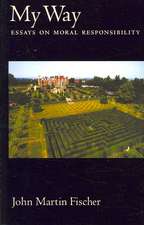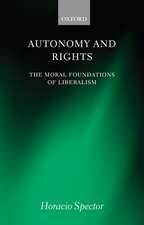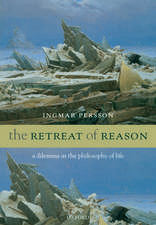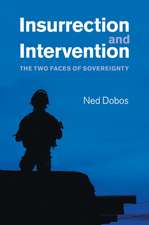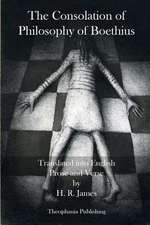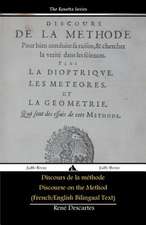Ethics, Security, and The War-Machine: The True Cost of the Military
Autor Ned Dobosen Limba Engleză Hardback – 13 mai 2020
Preț: 470.75 lei
Preț vechi: 653.17 lei
-28% Nou
Puncte Express: 706
Preț estimativ în valută:
90.12€ • 92.68$ • 74.76£
90.12€ • 92.68$ • 74.76£
Carte disponibilă
Livrare economică 18-24 ianuarie
Preluare comenzi: 021 569.72.76
Specificații
ISBN-13: 9780198860518
ISBN-10: 019886051X
Pagini: 182
Dimensiuni: 145 x 218 x 16 mm
Greutate: 0.34 kg
Editura: OUP OXFORD
Colecția OUP Oxford
Locul publicării:Oxford, United Kingdom
ISBN-10: 019886051X
Pagini: 182
Dimensiuni: 145 x 218 x 16 mm
Greutate: 0.34 kg
Editura: OUP OXFORD
Colecția OUP Oxford
Locul publicării:Oxford, United Kingdom
Recenzii
In most countries there is a deferential mystique about the military establishment and its vital role in guaranteeing national security. Ned Dobos's timely book is the most thorough, clear, and cogently argued philosophical critique of that mystique and its associated beliefs that I have read.
Dobos's case against a standing military establishment is the best one to date
If the best works of philosophy challenge our commonly held ideas, then this book is one of the best of its kind. Eloquently written, powerfully argued, and original in its approach, Ned Dobos masterfully and systematically dismantles our unquestioned acceptance of the need for societies to have military establishments. A wonderful book which should be read by everyone interested in politics and international relations.
Dobos shows not simply that standing armies have countervailing moral costs, but that in important respects they are self-defeating: A policy tool that has been established (at great expense) to further security and the rights of collective self-determination can itself be a major cause of insecurity, oppression, and foreign aggression.
Ned Dobos has written an extraordinarily comprehensive, deeply insightful, and highly readable book on the true costs of our military arrangements. I cannot think of a better book to provoke people to reflect on the ways in which war impacts our lives not always evident.
Dobos's argument is characteristically lucid and engaging, and the book is not only an excellent and highly welcome, but indeed a necessary addition to the current philosophical literature surrounding the ethics of war. Its profound practical, social, and political implications mean that the argument presented does not only deserve the attention of philosophers, politicians, or the military, but indeed of the average citizen.
Costa Rica abolished its military 75 years ago, choosing to invest in human development and to build a culture of peace instead. Whether or not other states decide to follow, Dobos shows us exactly what is at stake in this important decision. His book deserves to be carefully studied in every corner of the world.
We certainly know more about the true costs of maintaining a military thanks to Dobos' sharp critique in Ethics, Security, and the War-Machine.
An excellent book and a major contribution to the literature on pacifism, militarism, and the ethics of war more generally.
Ned Dobos' Ethics, Security, and the War-Machine provides a powerful and compelling account of the dangers of a standing army...excellent book and a major contribution to the literatureon pacifism, militarism, and the ethics of war.
Dobos's case against a standing military establishment is the best one to date
If the best works of philosophy challenge our commonly held ideas, then this book is one of the best of its kind. Eloquently written, powerfully argued, and original in its approach, Ned Dobos masterfully and systematically dismantles our unquestioned acceptance of the need for societies to have military establishments. A wonderful book which should be read by everyone interested in politics and international relations.
Dobos shows not simply that standing armies have countervailing moral costs, but that in important respects they are self-defeating: A policy tool that has been established (at great expense) to further security and the rights of collective self-determination can itself be a major cause of insecurity, oppression, and foreign aggression.
Ned Dobos has written an extraordinarily comprehensive, deeply insightful, and highly readable book on the true costs of our military arrangements. I cannot think of a better book to provoke people to reflect on the ways in which war impacts our lives not always evident.
Dobos's argument is characteristically lucid and engaging, and the book is not only an excellent and highly welcome, but indeed a necessary addition to the current philosophical literature surrounding the ethics of war. Its profound practical, social, and political implications mean that the argument presented does not only deserve the attention of philosophers, politicians, or the military, but indeed of the average citizen.
Costa Rica abolished its military 75 years ago, choosing to invest in human development and to build a culture of peace instead. Whether or not other states decide to follow, Dobos shows us exactly what is at stake in this important decision. His book deserves to be carefully studied in every corner of the world.
We certainly know more about the true costs of maintaining a military thanks to Dobos' sharp critique in Ethics, Security, and the War-Machine.
An excellent book and a major contribution to the literature on pacifism, militarism, and the ethics of war more generally.
Ned Dobos' Ethics, Security, and the War-Machine provides a powerful and compelling account of the dangers of a standing army...excellent book and a major contribution to the literatureon pacifism, militarism, and the ethics of war.
Notă biografică
Ned Dobos is Senior Lecturer in International and Political Studies at The University of New South Wales at the Australian Defence Force Academy. He is the author of Insurrection and Intervention: The Two Faces of Sovereignty (Cambridge 2012) and co-editor of Challenges for Humanitarian Intervention: Ethical Demand and Political Reality (Oxford 2018).




